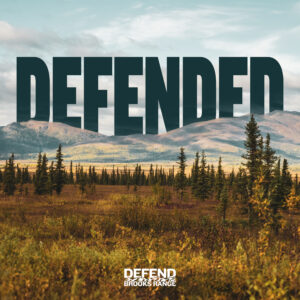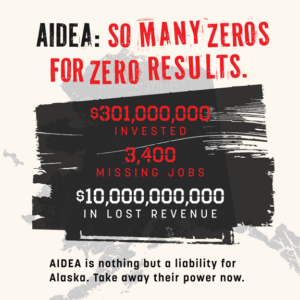
Are you a joyful animal? — Alaska News Brief April 2024
in America's Arctic, Clean Air and Water, Marine Ecosystems, News, Newsletters, People & Places
I returned to the office last week after spending part of my sabbatical hanging out with whales. Swimming in emails isn’t as spellbinding, I can tell you for sure, but I’m working on staying steady and mindful about my happy space. Let me explain.
Sperm whales speak to each other with clicking sounds (sonar), and they do so constantly. They talk to family members and other pods. They communicate as they curiously approach and hover some unmeasurable inches from your face. I know this because one whale floated within a foot of my face, her eye to my masked eyes, clicking in a language I do not understand.

Vicki and the whale–a still image from video.
Though I dare not anthropomorphize and put “words” into her mouth, it seemed as though she were saying, “Hey there, I’m a joyful being, how about you?”
Her curiosity, her gentleness, her fluidity, her ease—all astoundingly soothing and remarkable. Her presence among our group of humans left us awed, and I felt deeply entwined in kinship. I marveled at her willingness and capacity for connection, her gentleness and gaze, her uncanny utterances and, shall I say, trust.
What if we always treated animals as kin rather than beings to claim dominion over, or beings to commodify, or beings to extinguish when they’re in the way?
Another thing occurred to me on the first day I swam alongside whales off the coast of Dominica. Some of these whales surely knew firsthand the brutality of the commercial whaling industry, and others knew secondhand from other whales, because they share knowledge. They know human animals.
They know how to share the ocean with us and, I like to think, they sometimes try to share their wisdom with us.
Humans may have a legacy of forgetting our relationships with animals as beings, but we also know from science and deep in our bones that all living things communicate. Tree communication via connections in roots, plants through the release of chemicals, animals through sounds, smell, motion.
In so many ways, my return to my office means finding my role in only a slightly different place than it was before I left. The things I do now, how I’m interacting with people, haven’t changed much. We’re still waiting for movement toward the world we want and need to take care of all living things.

Vicki swimming alongside sperm whales off the coast of Dominica
Today that surreal, awe-space I experienced in the ocean with whales feels far away, yet I can pull it up as my happy place. It becomes the visceral, lived experience that grounds me in the work of taking care of Earth and all the beings that share it with us.
We may find ourselves surrounded by screens screaming at us to look at them and be driven to narrowly focus on the task at hand over and over again, but my memory of a young whale swimming up to me, seeing me, engaging with me, sustains in me a sure and palpable commitment to do what I can to take care of them and have their backs.
It makes zero sense to rip apart and fragment the places essential to living beings, or to
destroy any one particular part of those places, or species of beings, and to say it’s okay. Maybe this sounds political—as all striving for a better world now sounds political—and also it is simply about home, this Earth, and all of the ways this place holds us together and all of the ways that we together should hold Earth.
As my fingers click the keyboard now, I hold my happy place as a “taliswhale” (new word). I know in my bones that gaining and hording power over others inherently holds no meaning and that doing so drains the world and self of joy.
As for me, well I’m a joyful animal, how about you?


PS. Thanks to supporters like you, we can continue fighting to protect Alaska’s land, water, air, wildlife and people.





